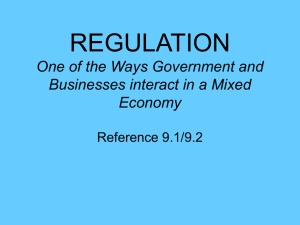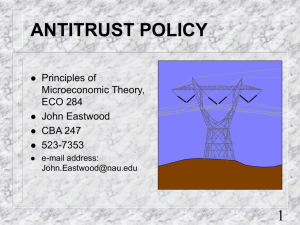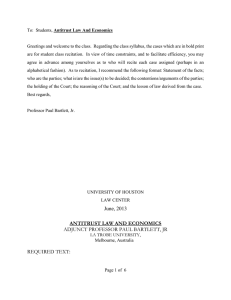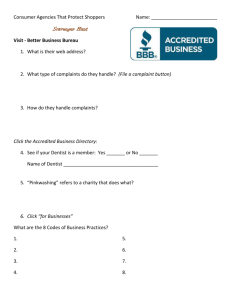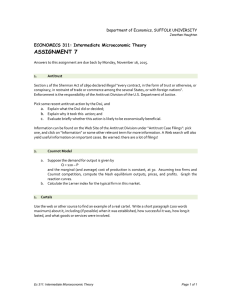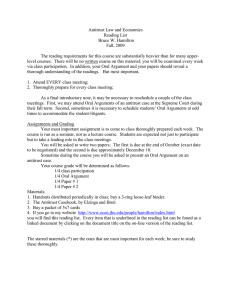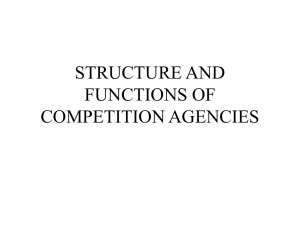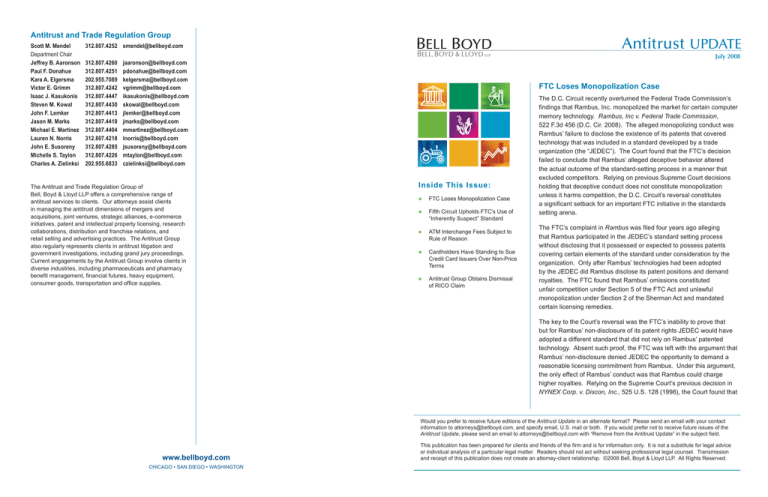
Antitrust and Trade Regulation Group
Scott M. Mendel
Department Chair
Jeffrey B. Aaronson
Paul F. Donahue
Kara A. Elgersma
Victor E. Grimm
Isaac J. Kasukonis
Steven M. Kowal
John F. Lemker
Jason M. Marks
Michael E. Martinez
Lauren N. Norris
John E. Susoreny
Michelle S. Taylon
Charles A. Zielinksi
Antitrust UPDATE
312.807.4252 smendel@bellboyd.com
July 2008
312.807.4260
312.807.4251
202.955.7089
312.807.4242
312.807.4447
312.807.4430
312.807.4413
312.807.4418
312.807.4404
312.807.4218
312.807.4285
312.807.4226
202.955.6833
jaaronson@bellboyd.com
pdonahue@bellboyd.com
kelgersma@bellboyd.com
vgrimm@bellboyd.com
ikasukonis@bellboyd.com
skowal@bellboyd.com
jlemker@bellboyd.com
jmarks@bellboyd.com
mmartinez@bellboyd.com
lnorris@bellboyd.com
jsusoreny@bellboyd.com
mtaylon@bellboyd.com
czielinksi@bellboyd.com
The Antitrust and Trade Regulation Group of
Bell, Boyd & Lloyd LLP offers a comprehensive range of
antitrust services to clients. Our attorneys assist clients
in managing the antitrust dimensions of mergers and
acquisitions, joint ventures, strategic alliances, e-commerce
initiatives, patent and intellectual property licensing, research
collaborations, distribution and franchise relations, and
retail selling and advertising practices. The Antitrust Group
also regularly represents clients in antitrust litigation and
government investigations, including grand jury proceedings.
Current engagements by the Antitrust Group involve clients in
diverse industries, including pharmaceuticals and pharmacy
benefit management, financial futures, heavy equipment,
consumer goods, transportation and office supplies.
FTC Loses Monopolization Case
Inside This Issue:
z
FTC Loses Monopolization Case
z
Fifth Circuit Upholds FTC’s Use of
“Inherently Suspect” Standard
z
ATM Interchange Fees Subject to
Rule of Reason
z
Cardholders Have Standing to Sue
Credit Card Issuers Over Non-Price
Terms
z
Antitrust Group Obtains Dismissal
of RICO Claim
The D.C. Circuit recently overturned the Federal Trade Commission’s
findings that Rambus, Inc. monopolized the market for certain computer
memory technology. Rambus, Inc v. Federal Trade Commission,
522 F.3d 456 (D.C. Cir. 2008). The alleged monopolizing conduct was
Rambus’ failure to disclose the existence of its patents that covered
technology that was included in a standard developed by a trade
organization (the “JEDEC”). The Court found that the FTC’s decision
failed to conclude that Rambus’ alleged deceptive behavior altered
the actual outcome of the standard-setting process in a manner that
excluded competitors. Relying on previous Supreme Court decisions
holding that deceptive conduct does not constitute monopolization
unless it harms competition, the D.C. Circuit’s reversal constitutes
a significant setback for an important FTC initiative in the standards
setting arena.
The FTC’s complaint in Rambus was filed four years ago alleging
that Rambus participated in the JEDEC’s standard setting process
without disclosing that it possessed or expected to possess patents
covering certain elements of the standard under consideration by the
organization. Only after Rambus’ technologies had been adopted
by the JEDEC did Rambus disclose its patent positions and demand
royalties. The FTC found that Rambus’ omissions constituted
unfair competition under Section 5 of the FTC Act and unlawful
monopolization under Section 2 of the Sherman Act and mandated
certain licensing remedies.
The key to the Court’s reversal was the FTC’s inability to prove that
but for Rambus’ non-disclosure of its patent rights JEDEC would have
adopted a different standard that did not rely on Rambus’ patented
technology. Absent such proof, the FTC was left with the argument that
Rambus’ non-disclosure denied JEDEC the opportunity to demand a
reasonable licensing commitment from Rambus. Under this argument,
the only effect of Rambus’ conduct was that Rambus could charge
higher royalties. Relying on the Supreme Court’s previous decision in
NYNEX Corp. v. Discon, Inc., 525 U.S. 128 (1998), the Court found that
Would you prefer to receive future editions of the Antitrust Update in an alternate format? Please send an email with your contact
information to attorneys@bellboyd.com, and specify email, U.S. mail or both. If you would prefer not to receive future issues of the
Antitrust Update, please send an email to attorneys@bellboyd.com with “Remove from the Antitrust Update” in the subject field.
www.bellboyd.com
CHICAGO • SAN DIEGO • WASHINGTON
This publication has been prepared for clients and friends of the firm and is for information only. It is not a substitute for legal advice
or individual analysis of a particular legal matter. Readers should not act without seeking professional legal counsel. Transmission
and receipt of this publication does not create an attorney-client relationship. ©2008 Bell, Boyd & Lloyd LLP. All Rights Reserved.
higher royalties, even if achieved through deception,
would not likely exclude rivals or decrease competition
and could not constitute the “exclusionary” conduct
required for monopolization. The exclusion was the
result of Rambus’ lawfully obtained patents, not its nondisclosure during the standard setting process.
The Court’s opinion is important in two respects. First,
it reaffirms that conduct violates Section 2 of the
Sherman Act only if it is exclusionary. Second, the
opinion emphasizes the need for all standards setting
organizations to clarify and proactively monitor member
disclosure obligations.
Fifth Circuit Upholds FTC’s Use of
“Inherently Suspect” Standard
The Fifth Circuit upheld the Federal Trade
Commission’s finding that the activities of an
organization of independent physicians and physician
groups constituted horizontal price-fixing. North Texas
Specialty Physicians v. FTC, 2008 WL 2043040,
No. 06-60023 (5th Cir., May 14, 2008). The FTC
stopped short of applying the per se rule, employing
instead an “inherently suspect” standard. The Fifth
Circuit upheld this approach, equating it to a “quicklook” rule of reason analysis.
North Texas Specialty Physicians (NTSP) is a
non-profit organization of independent physicians
and physician groups that negotiates and reviews
contracts between its members and “payors,” such as
insurance companies, HMOs, PPOs, and self-insured
employers. As part of NTSP’s process of negotiating
fee-for-service arrangements between the payors and
its member physicians, NTSP polls its physicians to
determine the minimum rate each would accept in
a contract, calculates the mean, median and mode
based on those polls, and then uses a minimum
contract fee based on those calculations. The FTC
issued an administrative complaint in September 2003,
challenging NTSP’s conduct as a form of a horizontal
price-fixing among its member physicians.
The FTC utilized an “inherently suspect” analysis in
finding that the challenged practices were unlawful.
The “inherently suspect” standard requires more proof
than the per se rule, but stops well short of a full-blown
rule of reason. Under the standard, the burden is on
the defendant to proffer a plausible pro-competitive
justification for the challenged practice. Only if the
defendant provides such a justification does the burden
shift back to the plaintiff, or FTC, to prove that the
practice has had an actual anticompetitive effect. In
this case, FTC concluded that NTSP failed to provide a
plausible pro-competitive justification for its negotiating
practices and, therefore, FTC banned the practices
without proof of their actual anticompetitive effect.
The Fifth Circuit found no error in the FTC’s analytical
framework, finding that the “net anticompetitive effects
of certain of NTSP’s practices were obvious,” and the
pro-competitive justifications offered by NTSP were
not plausible. This case signals that the FTC will
continue to look for shortcuts in proving that practices
are anticompetitive and that appellate courts will be
receptive to these efforts in appropriate cases. It can
be expected that private plaintiffs will try to use the
“inherently suspect” standard in cases that do not
come within the per se rule.”
ATM Interchange Fees Subject to Rule of
Reason
Delving into an area of antitrust law it characterized
as “unsettled, unclear, unwieldy, and unequivocally
complex,” the Northern District of California recently
ruled that the rule of reason – not the per se
rule – should apply to a joint venture’s setting of ATM
interchange fees. In re ATM Fee Antitrust Litigation,
2008 U.S. Dist. LEXIS 22901 (March 24, 2008).
The court determined that the rule of reason should
apply for two reasons, each of which was individually
sufficient to avoid per se treatment: (1) fee-setting was
a “core activity” of the joint venture, and (2) the fee
was reasonably ancillary to the legitimate cooperative
aspects of a joint venture.
A class of ATM users brought suit against the Star ATM
network, alleging that the network violated Section 1 of
the Sherman Act by setting a network-wide interchange
fee that governs the amount paid by the bank issuing
the ATM card to the bank owning the ATM when the
ATM is used by the issuing bank’s customer. Plaintiffs
ANTITRUST
UPDATE
claimed that the uniform interchange fee was horizontal
price fixing and a per se violation of Section 1.
Defendants countered that the fee compensates ATM
owners for making their machines available to the
banks’ customers and provides an incentive for the
deployment of ATMs.
The court recognized that horizontal price-fixing
agreements are subject to per se condemnation.
However, the court noted that joint ventures are often
pro-competitive, by offering products or services that
no individual member of the venture could offer on its
own. In analyzing the Star ATM network’s interchange
fee, and relying on the analysis of the Supreme Court’s
recent decision in Texaco Inc. v. Dagher, 547 U.S. 1
(2006), the court employed the “core function” test:
whether the setting of an interchange fee is the “core
activity” of the Star network. The court found that the
uniform interchange fee was a core activity because
the joint venture had to put a price on the service it was
offering. Therefore, the challenged price setting had to
be judged under the rule of reason. The court further
held that even if the interchange fee were not a core
activity, the rule of reason would apply because the fee
is reasonably ancillary to the joint venture’s legitimate
business purpose.
Cardholders Have Standing to Sue Credit
Card Issuers Over Non-Price Terms
The Second Circuit in Ross et al. v. Bank of America,
N.A. (USA) et al., 624 F.3d 217 (2d Cir. 2008),
reinstated a putative class action by individual credit
cardholders against a group of card-issuing banks
over the dispute resolution provisions of their credit
card agreements. The District Court dismissed the
complaint, holding that the plaintiffs lacked standing
because the alleged conspiracy by issuing banks to
include in the cardholder agreement arbitration clauses
and prohibitions against class actions had caused no
present injury to the cardholders.
the Court ruled that the banks effectively denied
cardholders the services of class action attorneys in
monitoring the legality of the banks’ actions. Second,
the Court believed that by requiring arbitration clauses,
the banks forced less valuable cards upon cardholders
than those which permitted a choice of court action or
arbitration to resolve disputes.
The Second Circuit also declined to apply the Supreme
Court’s recent Bell Atlantic Corp. v. Twombly, 127 S.
Ct. 1955 (2007) heightened pleading standard for
antitrust conspiracies to the question of constitutional
standing, stating that “plausibility is not at issue at this
point, as we are considering only Article III standing.”
Antitrust Group Obtains Dismissal of
RICO Claim
A team of Antitrust Group lawyers, including Scott
Mendel, Michael Martinez, Kara Elgersma and Jason
Marks, successfully obtained dismissal with prejudice
of a federal RICO claim asserted against Deere &
Company in a proported class action involving all
purchasers of lawnmowers in the United States since
1994. The plaintiffs claimed that the lawnmower
industry has misrepresented the horsepower of
lawnmower engines and sought to certify a nationwide
class under RICO. The District Court for the Southern
District of Illinois found that the plaintiffs had not
alleged the elements required to state a RICO claim
and that no amendment of the complaint could cure its
deficiencies.
The Second Circuit disagreed, finding that the plaintiffs
had adequately alleged injury by claiming that the
banks’ actions had reduced cardholders’ choices and
the quality of the credit services available to them in at
least two respects. First, by prohibiting class actions,
ANTITRUST
UPDATE
higher royalties, even if achieved through deception,
would not likely exclude rivals or decrease competition
and could not constitute the “exclusionary” conduct
required for monopolization. The exclusion was the
result of Rambus’ lawfully obtained patents, not its nondisclosure during the standard setting process.
The Court’s opinion is important in two respects. First,
it reaffirms that conduct violates Section 2 of the
Sherman Act only if it is exclusionary. Second, the
opinion emphasizes the need for all standards setting
organizations to clarify and proactively monitor member
disclosure obligations.
Fifth Circuit Upholds FTC’s Use of
“Inherently Suspect” Standard
The Fifth Circuit upheld the Federal Trade
Commission’s finding that the activities of an
organization of independent physicians and physician
groups constituted horizontal price-fixing. North Texas
Specialty Physicians v. FTC, 2008 WL 2043040,
No. 06-60023 (5th Cir., May 14, 2008). The FTC
stopped short of applying the per se rule, employing
instead an “inherently suspect” standard. The Fifth
Circuit upheld this approach, equating it to a “quicklook” rule of reason analysis.
North Texas Specialty Physicians (NTSP) is a
non-profit organization of independent physicians
and physician groups that negotiates and reviews
contracts between its members and “payors,” such as
insurance companies, HMOs, PPOs, and self-insured
employers. As part of NTSP’s process of negotiating
fee-for-service arrangements between the payors and
its member physicians, NTSP polls its physicians to
determine the minimum rate each would accept in
a contract, calculates the mean, median and mode
based on those polls, and then uses a minimum
contract fee based on those calculations. The FTC
issued an administrative complaint in September 2003,
challenging NTSP’s conduct as a form of a horizontal
price-fixing among its member physicians.
The FTC utilized an “inherently suspect” analysis in
finding that the challenged practices were unlawful.
The “inherently suspect” standard requires more proof
than the per se rule, but stops well short of a full-blown
rule of reason. Under the standard, the burden is on
the defendant to proffer a plausible pro-competitive
justification for the challenged practice. Only if the
defendant provides such a justification does the burden
shift back to the plaintiff, or FTC, to prove that the
practice has had an actual anticompetitive effect. In
this case, FTC concluded that NTSP failed to provide a
plausible pro-competitive justification for its negotiating
practices and, therefore, FTC banned the practices
without proof of their actual anticompetitive effect.
The Fifth Circuit found no error in the FTC’s analytical
framework, finding that the “net anticompetitive effects
of certain of NTSP’s practices were obvious,” and the
pro-competitive justifications offered by NTSP were
not plausible. This case signals that the FTC will
continue to look for shortcuts in proving that practices
are anticompetitive and that appellate courts will be
receptive to these efforts in appropriate cases. It can
be expected that private plaintiffs will try to use the
“inherently suspect” standard in cases that do not
come within the per se rule.”
ATM Interchange Fees Subject to Rule of
Reason
Delving into an area of antitrust law it characterized
as “unsettled, unclear, unwieldy, and unequivocally
complex,” the Northern District of California recently
ruled that the rule of reason – not the per se
rule – should apply to a joint venture’s setting of ATM
interchange fees. In re ATM Fee Antitrust Litigation,
2008 U.S. Dist. LEXIS 22901 (March 24, 2008).
The court determined that the rule of reason should
apply for two reasons, each of which was individually
sufficient to avoid per se treatment: (1) fee-setting was
a “core activity” of the joint venture, and (2) the fee
was reasonably ancillary to the legitimate cooperative
aspects of a joint venture.
A class of ATM users brought suit against the Star ATM
network, alleging that the network violated Section 1 of
the Sherman Act by setting a network-wide interchange
fee that governs the amount paid by the bank issuing
the ATM card to the bank owning the ATM when the
ATM is used by the issuing bank’s customer. Plaintiffs
ANTITRUST
UPDATE
claimed that the uniform interchange fee was horizontal
price fixing and a per se violation of Section 1.
Defendants countered that the fee compensates ATM
owners for making their machines available to the
banks’ customers and provides an incentive for the
deployment of ATMs.
The court recognized that horizontal price-fixing
agreements are subject to per se condemnation.
However, the court noted that joint ventures are often
pro-competitive, by offering products or services that
no individual member of the venture could offer on its
own. In analyzing the Star ATM network’s interchange
fee, and relying on the analysis of the Supreme Court’s
recent decision in Texaco Inc. v. Dagher, 547 U.S. 1
(2006), the court employed the “core function” test:
whether the setting of an interchange fee is the “core
activity” of the Star network. The court found that the
uniform interchange fee was a core activity because
the joint venture had to put a price on the service it was
offering. Therefore, the challenged price setting had to
be judged under the rule of reason. The court further
held that even if the interchange fee were not a core
activity, the rule of reason would apply because the fee
is reasonably ancillary to the joint venture’s legitimate
business purpose.
Cardholders Have Standing to Sue Credit
Card Issuers Over Non-Price Terms
The Second Circuit in Ross et al. v. Bank of America,
N.A. (USA) et al., 624 F.3d 217 (2d Cir. 2008),
reinstated a putative class action by individual credit
cardholders against a group of card-issuing banks
over the dispute resolution provisions of their credit
card agreements. The District Court dismissed the
complaint, holding that the plaintiffs lacked standing
because the alleged conspiracy by issuing banks to
include in the cardholder agreement arbitration clauses
and prohibitions against class actions had caused no
present injury to the cardholders.
the Court ruled that the banks effectively denied
cardholders the services of class action attorneys in
monitoring the legality of the banks’ actions. Second,
the Court believed that by requiring arbitration clauses,
the banks forced less valuable cards upon cardholders
than those which permitted a choice of court action or
arbitration to resolve disputes.
The Second Circuit also declined to apply the Supreme
Court’s recent Bell Atlantic Corp. v. Twombly, 127 S.
Ct. 1955 (2007) heightened pleading standard for
antitrust conspiracies to the question of constitutional
standing, stating that “plausibility is not at issue at this
point, as we are considering only Article III standing.”
Antitrust Group Obtains Dismissal of
RICO Claim
A team of Antitrust Group lawyers, including Scott
Mendel, Michael Martinez, Kara Elgersma and Jason
Marks, successfully obtained dismissal with prejudice
of a federal RICO claim asserted against Deere &
Company in a proported class action involving all
purchasers of lawnmowers in the United States since
1994. The plaintiffs claimed that the lawnmower
industry has misrepresented the horsepower of
lawnmower engines and sought to certify a nationwide
class under RICO. The District Court for the Southern
District of Illinois found that the plaintiffs had not
alleged the elements required to state a RICO claim
and that no amendment of the complaint could cure its
deficiencies.
The Second Circuit disagreed, finding that the plaintiffs
had adequately alleged injury by claiming that the
banks’ actions had reduced cardholders’ choices and
the quality of the credit services available to them in at
least two respects. First, by prohibiting class actions,
ANTITRUST
UPDATE
Antitrust and Trade Regulation Group
Scott M. Mendel
Department Chair
Jeffrey B. Aaronson
Paul F. Donahue
Kara A. Elgersma
Victor E. Grimm
Isaac J. Kasukonis
Steven M. Kowal
John F. Lemker
Jason M. Marks
Michael E. Martinez
Lauren N. Norris
John E. Susoreny
Michelle S. Taylon
Charles A. Zielinksi
Antitrust UPDATE
312.807.4252 smendel@bellboyd.com
July 2008
312.807.4260
312.807.4251
202.955.7089
312.807.4242
312.807.4447
312.807.4430
312.807.4413
312.807.4418
312.807.4404
312.807.4218
312.807.4285
312.807.4226
202.955.6833
jaaronson@bellboyd.com
pdonahue@bellboyd.com
kelgersma@bellboyd.com
vgrimm@bellboyd.com
ikasukonis@bellboyd.com
skowal@bellboyd.com
jlemker@bellboyd.com
jmarks@bellboyd.com
mmartinez@bellboyd.com
lnorris@bellboyd.com
jsusoreny@bellboyd.com
mtaylon@bellboyd.com
czielinksi@bellboyd.com
The Antitrust and Trade Regulation Group of
Bell, Boyd & Lloyd LLP offers a comprehensive range of
antitrust services to clients. Our attorneys assist clients
in managing the antitrust dimensions of mergers and
acquisitions, joint ventures, strategic alliances, e-commerce
initiatives, patent and intellectual property licensing, research
collaborations, distribution and franchise relations, and
retail selling and advertising practices. The Antitrust Group
also regularly represents clients in antitrust litigation and
government investigations, including grand jury proceedings.
Current engagements by the Antitrust Group involve clients in
diverse industries, including pharmaceuticals and pharmacy
benefit management, financial futures, heavy equipment,
consumer goods, transportation and office supplies.
FTC Loses Monopolization Case
Inside This Issue:
z
FTC Loses Monopolization Case
z
Fifth Circuit Upholds FTC’s Use of
“Inherently Suspect” Standard
z
ATM Interchange Fees Subject to
Rule of Reason
z
Cardholders Have Standing to Sue
Credit Card Issuers Over Non-Price
Terms
z
Antitrust Group Obtains Dismissal
of RICO Claim
The D.C. Circuit recently overturned the Federal Trade Commission’s
findings that Rambus, Inc. monopolized the market for certain computer
memory technology. Rambus, Inc v. Federal Trade Commission,
522 F.3d 456 (D.C. Cir. 2008). The alleged monopolizing conduct was
Rambus’ failure to disclose the existence of its patents that covered
technology that was included in a standard developed by a trade
organization (the “JEDEC”). The Court found that the FTC’s decision
failed to conclude that Rambus’ alleged deceptive behavior altered
the actual outcome of the standard-setting process in a manner that
excluded competitors. Relying on previous Supreme Court decisions
holding that deceptive conduct does not constitute monopolization
unless it harms competition, the D.C. Circuit’s reversal constitutes
a significant setback for an important FTC initiative in the standards
setting arena.
The FTC’s complaint in Rambus was filed four years ago alleging
that Rambus participated in the JEDEC’s standard setting process
without disclosing that it possessed or expected to possess patents
covering certain elements of the standard under consideration by the
organization. Only after Rambus’ technologies had been adopted
by the JEDEC did Rambus disclose its patent positions and demand
royalties. The FTC found that Rambus’ omissions constituted
unfair competition under Section 5 of the FTC Act and unlawful
monopolization under Section 2 of the Sherman Act and mandated
certain licensing remedies.
The key to the Court’s reversal was the FTC’s inability to prove that
but for Rambus’ non-disclosure of its patent rights JEDEC would have
adopted a different standard that did not rely on Rambus’ patented
technology. Absent such proof, the FTC was left with the argument that
Rambus’ non-disclosure denied JEDEC the opportunity to demand a
reasonable licensing commitment from Rambus. Under this argument,
the only effect of Rambus’ conduct was that Rambus could charge
higher royalties. Relying on the Supreme Court’s previous decision in
NYNEX Corp. v. Discon, Inc., 525 U.S. 128 (1998), the Court found that
Would you prefer to receive future editions of the Antitrust Update in an alternate format? Please send an email with your contact
information to attorneys@bellboyd.com, and specify email, U.S. mail or both. If you would prefer not to receive future issues of the
Antitrust Update, please send an email to attorneys@bellboyd.com with “Remove from the Antitrust Update” in the subject field.
www.bellboyd.com
CHICAGO • SAN DIEGO • WASHINGTON
This publication has been prepared for clients and friends of the firm and is for information only. It is not a substitute for legal advice
or individual analysis of a particular legal matter. Readers should not act without seeking professional legal counsel. Transmission
and receipt of this publication does not create an attorney-client relationship. ©2008 Bell, Boyd & Lloyd LLP. All Rights Reserved.

